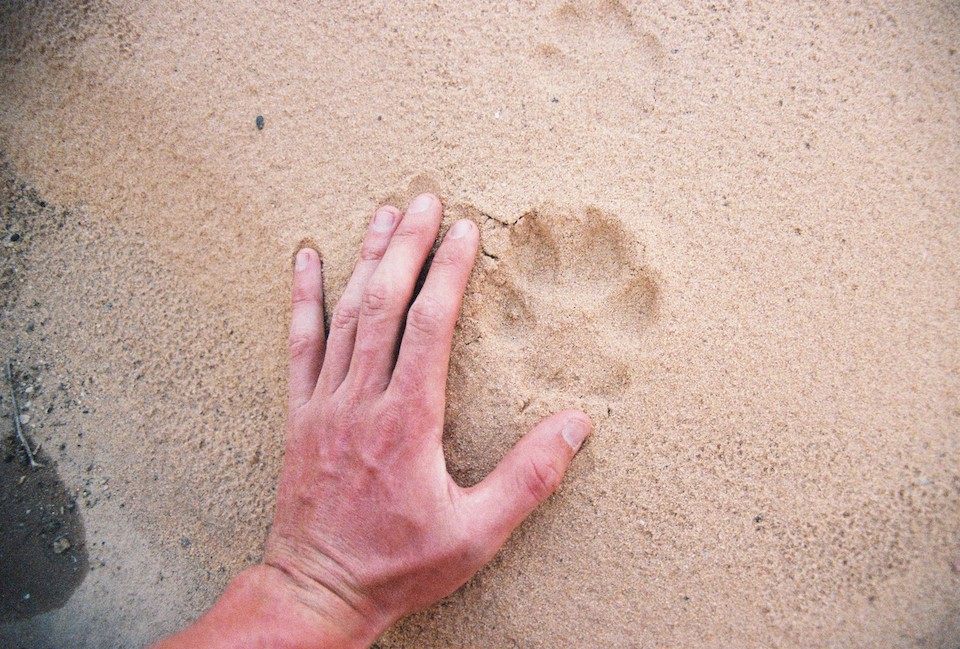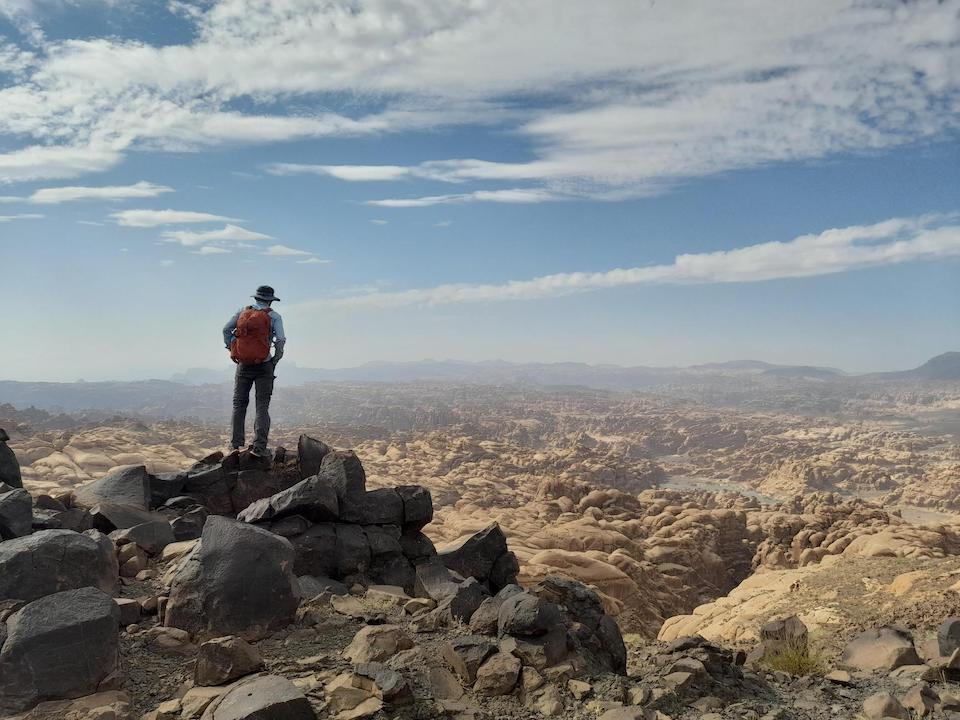
In the heat of it: Carnivore conservation in Saudi Arabia with Ross de Bruin
“I think everyone’s conservation career paths are very different.”
Ross de Bruin works in large carnivore conservation as a Field Researcher for Panthera, a nonprofit organization dedicated to preserving the world’s 40 species of wild cats. Prior to this, he worked for the Cape Leopard Trust (CLT), a South African based leader in African leopard conservation.
Born and raised in South Africa, Ross currently helps Panthera support the Royal Commission for AlUla (RCU) in conserving the Critically Endangered Arabian Leopard in Saudi Arabia.
Getting started
“For those of us who enjoy animals and nature, you really [have to] put a lot of effort into making sure that it becomes a bigger part of your life.”
Ross de Bruin grew up in the bush, amongst the wildlife of South Africa and Mozambique. Fascinated with wildlife from an early age, he spent his childhood reading Gerald Durrell, the British naturalist, zookeeper and author.
So, when it came time to start thinking about a career, Ross knew exactly what he wanted to do. His undying passion for animals and nature has been the main driving force as his career has developed.
“My father made sure that I had the opportunity to go and study and get a tertiary education. So, I went off and studied zoology. I had no idea how my career was going to pan out. I just stayed committed to the idea that I wanted to be in conservation,” he said.
After completing his Honours in Zoology at South Africa’s University of the Free State, Ross earned his Field Guide Association of South Africa (FGASA) Level 1 qualification. He began guiding tourists for the Grootbos Private Nature Reserve, which allowed him to share his passion for wildlife. After a couple of years, he moved into Conservation Education, working for the Shamwari Wildlife Experience.
“When I started, I had no idea how my career would develop, but I knew that I wanted to experience a variety of environments, work around wild animals, and to become more exposed to wildlife conservation,” he explained.
For Ross and many of his peers, it’s difficult working in conservation because conservationists get a front row seat to the disruption, destruction and true state of the planet as demonstrated by science.
“It is hard not to be pessimistic in our field, especially if you’re naturally a somewhat pessimistic person.”
As said by American climate journalist David Wallace-Wells: “It’s worse, so much worse than you think.”
Despite these realities, Ross was not discouraged. He continued along his path, moving from the tourism sector into Conservation Education. However, he still wanted to make a more direct contribution to conservation.
To gain more experience in practical wildlife conservation, Ross joined an internship with a wildlife monitoring programme, studying wild dogs and black rhinos in KwaZulu-Natal, a coastal South African province. He also assisted with tracking and data collection on a project in Botswana.
Ross’ advice is to: “Go out and get as much hands-on experience as possible, especially early on in your career.”
Ross was lucky to grow up in a country renowned for its wildlife, but there are opportunities to gain valuable wildlife conservation experience in everyone’s backyard.
The experience he gained working on these different projects prepared him for his current Field Technician role, where he has the privilege of helping Arabian leopards with Panthera and the Royal Commission for AlUla (RCU), in Saudi Arabia. As conservationists progress in their careers, they begin to develop a reputation amongst peers and conservation leaders. While qualifications and experience are important, networking and relationship building is crucial for developing a career in conservation.
When Ross applied for his current job, he was working for a human-wildlife conflict mitigation project with baboons – a project that he was quite enjoying.
“But as soon as I heard ‘Panthera’ and ‘Saudi Arabia’, I jumped at the opportunity!”
Ross’ current work
“I love that I get to experience all these different cultures and that I get to travel… I feel that I might be contributing towards some sort of big picture.”
In his current role as a Panthera Field Technician for the RCU’s Arabian Leopard Initiative, Ross spends most of his time working in the rugged landscape of north-western Saudi Arabia. His work focuses on running camera trap surveys to monitor the recovery of leopard prey populations.
His camera trapping experience with the CLT, much closer to home, prepared him for this more adventurous role. However, according to Ross, roles evolve as you grow into a position. He is beginning to diversify his responsibilities to include work in human-wildlife conflict mitigation, an essential component of all large carnivore conservation work.
“As projects evolve, so does my role. My expertise is in camera trapping, so that’s what I was hired to do.”
Ross began this role during the COVID pandemic. With lockdowns and restrictions, his first trip to Saudi Arabia in 2020 became even more adventurous than anticipated. His first few months were eye-opening. Experiencing a new culture very different than his own rapidly broadened his perspective and gave him a new appreciation for how different cultures interact with nature. He recommends stepping far out of your comfort zone whenever possible, scary though this may be, because the learning experience will change your life.
“It’s been a very enlightening experience. It’s an incredible place, with incredible people, in an incredible landscape. It really has been a privilege to continue to work there.”
All places have their challenges. In Saudi Arabia, the climate is particularly punishing. Long hikes of up to 25 km in rugged mountains and temperatures over 40˚ C are not to be taken lightly. Ross’ team takes great care to monitor each other and to ensure they have plenty of water, rehydration salts, and seek out shade and rest when necessary.
“We’ve had incidences of heatstroke before with field team members and with other people that have joined us in the field,” Ross admitted. “You do have to have a certain amount of tolerance to the heat.”
There is also another set of challenges in the field. Before Ross and the team can set up camera traps, they must conduct a preliminary desktop survey of a new study area to identify access points, map potential camera sites, and to ensure the survey maintains the integrity of the area and supports robust data extrapolation. Following this, the field team heads out into the mountains, navigating through landscapes they have never seen before and driving remote, often unmapped, roads.
“There’s a lot of thinking on the fly,” Ross stated.
Even though the work is rewarding, there are challenges related to working away from friends and family for extended periods of time.
“Your normal life takes a back seat when you are in the field. That can be quite difficult.”
That said, Ross feels that at least two-thirds of the time he loves what he is doing – even if for the other third he is quite miserable, tired, sore and sunburned, and maybe missing home.
“But I think that the best part for me is that the majority of the time, I actually, genuinely love what I do.”
“Being out in nature so much is really a privilege. I mean, I get paid to walk up mountains!”
Hope for the future
“There’s a lot of eco-anxiety flooding the conservation field, especially among young conservationists and people who are more mindful to the realities of what’s going on.”
Ross believes that now is an exciting time to work in wildlife conservation because there is a strong global movement to reverse devastating processes like climate change and biodiversity loss.
He sees just how much more focus and attention conservation has been receiving recently than in the past. More governments have begun to collaborate with NGOs, making headway and gathering momentum. Through the IUCN and other conservation bodies, good conservation practice is becoming mandated as law.
Ross believes there will be a lot of upcoming opportunities for young conservationists to bring fresh ideas into the field. He says there are a lot of big, landscape-level projects gathering momentum right now. As the conservation industry develops, focus is shifting away from exploration and primary science in favour of applied conservation action, with particular emphasis being placed on the intersection of wildlife and communities – a particularly important and exciting field.
“There are not many wild areas left, and I think we often forget that there are people actually living in these areas,” said Ross.
“When you start getting into the field, you realise how complex these issues are, and you start to understand why they are such big issues… It seems quite easy to just propose a solution, but when you actually get into the nitty gritty stuff, you start to see that it’s an issue for a reason. It’s not that easily solved. But there are a lot of novel approaches and fresh minds coming in. It is a very exciting time.”
Want to know more?
Check out these links to discover even more about Panthera, the RCU and the Arabian Leopard Initiative.
Author Profile | Jasmine Santilhano

Interviews, Celebrating Diversity in Conservation, Scientist





